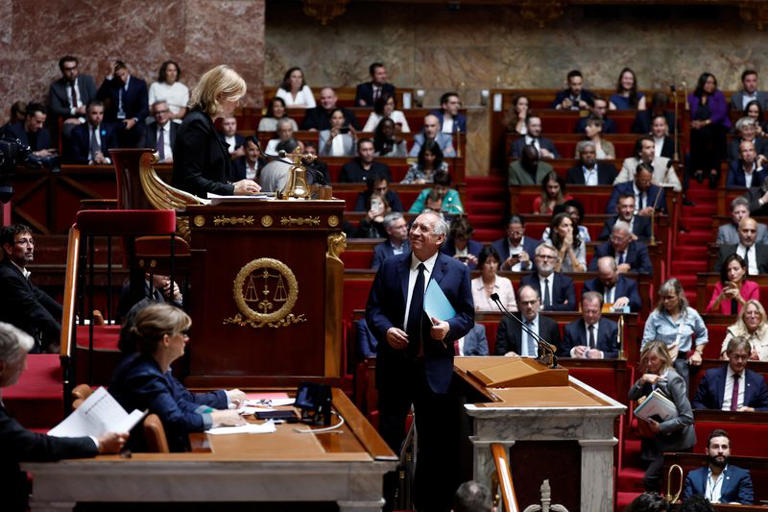France, often described as the beating heart of Europe, is once again mired in political chaos. Prime Minister François Bayrou’s government has collapsed after losing a confidence vote in the National Assembly, marking the third leadership change in just one year and the fourth under President Emmanuel Macron’s turbulent presidency. The decisive vote on September 8 — 364 against, 194 in favor — not only toppled Bayrou but also underscored the fragility of governance in a deeply divided political landscape.
The drama in Paris is more than a domestic shake-up. With public disillusionment surging, street protests escalating, and markets rattled, France risks sliding into a prolonged period of paralysis that could reverberate across the European Union. Once considered a pillar of continental stability, the country now finds itself edging uncomfortably closer to the economic and political uncertainty traditionally associated with Europe’s periphery.
Bayrou’s Fall: Austerity Meets Resistance
François Bayrou’s premiership was brief but fraught with conflict. His central mission — restoring fiscal discipline to France’s heavily indebted state — rested on a program of austerity that sought to rein in soaring deficits. Among his proposals were the elimination of public holidays, sweeping cuts to subsidies, and reductions in public-sector spending.
Yet rather than rally support, Bayrou’s measures ignited fierce opposition across the political spectrum. The far-left condemned the austerity program as an assault on workers and public services, while the far-right decried it as an elite-driven betrayal of national priorities. Even centrist deputies, supposedly his natural allies, balked at the scope of the cuts.
In the end, Bayrou’s unwillingness to compromise sealed his fate. Political survival in France’s fragmented assembly requires coalition-building and consensus — qualities his government failed to embody. The confidence vote became a referendum not only on his policies but also on his governing style, and he lost decisively.
Public Disillusionment and the “Block Everything” Movement
If parliamentary maneuvering toppled Bayrou, the streets supplied the momentum. France has long been a country where public protest serves as a barometer of legitimacy, and Bayrou’s austerity agenda triggered a powerful backlash.
The “Block Everything” movement — a loose coalition of unions, student groups, and grassroots activists — organized widespread demonstrations that paralyzed transport networks, disrupted fuel distribution, and brought tens of thousands into the streets. Authorities deployed nearly 80,000 police officers nationwide in a bid to contain unrest, but the sheer scale of discontent evoked memories of the Yellow Vest movement that shook Macron’s presidency in 2018–19.
The symbolism of protest is deeply ingrained in French political culture. From May 1968 to the pension reform strikes of 2023, street mobilization has often defined the boundaries of what governments can achieve. Bayrou’s failure to anticipate or defuse this anger highlighted the growing gap between political elites and ordinary citizens — a gap Macron’s administration has repeatedly struggled to bridge.
Economic Fallout: French Markets Wobble
Political instability quickly translated into financial turbulence. French government bond markets — once considered among the safest in the Eurozone — showed visible strain. Yields on 10-year bonds spiked above 3.4 percent, surpassing those of Greece and approaching Italian levels. The spread between French and German bonds widened sharply, a clear sign that investors now perceive Paris as a riskier borrower.
France’s public debt, already above 114 percent of GDP, looms as a structural vulnerability. Rising borrowing costs compound the challenge, threatening to squeeze fiscal space and limit future spending flexibility. For years, France has relied on the credibility of its institutions and the relative safety of Eurozone integration to maintain investor confidence. That confidence is now eroding.
The implications go beyond France. As the Eurozone’s second-largest economy, instability in Paris threatens to ripple across the bloc. The idea of France as part of Europe’s “periphery” — a term usually reserved for debt-burdened states like Greece, Portugal, or Italy — has entered mainstream financial commentary. That shift carries symbolic weight: if France wobbles, Europe’s entire economic foundation could come under strain.
Macron’s Leadership Tested: A Presidency Under Siege
President Emmanuel Macron now faces one of the gravest tests of his political career. With Bayrou’s ouster, he must appoint his fifth prime minister in less than two years, an extraordinary rate of turnover that undercuts perceptions of stability. Each appointment is a gamble: too centrist, and Macron risks losing the left; too reformist, and he alienates conservatives; too independent, and he risks eroding his own influence.
Macron’s political style — ambitious, technocratic, and often uncompromising — has fueled both admiration and resentment. He has sought to project France as a global power, championing European integration, strategic autonomy, and active diplomacy on issues from Ukraine to the Middle East. Yet at home, his presidency has been repeatedly destabilized by unrest and parliamentary deadlock.
The current crisis magnifies this tension. Without a parliamentary majority, Macron struggles to pass legislation. The repeated turnover of prime ministers suggests not renewal but paralysis, raising questions about whether his presidency can still deliver meaningful policy outcomes.
A Fractured Assembly: The Politics of Gridlock
The National Assembly is the epicenter of France’s instability. Unlike previous decades when a strong presidential majority could secure legislative backing, today’s assembly is fragmented among multiple blocs: Macron’s centrist Renaissance party, the left-wing coalition led by Jean-Luc Mélenchon, Marine Le Pen’s far-right National Rally, and a scattering of smaller groups.
This fragmentation makes governing extraordinarily difficult. No bloc commands a majority, and coalition politics — long alien to French traditions — have become a necessity. Yet deep ideological divides thwart compromise. On issues from fiscal policy to immigration to European integration, the assembly is polarized and combative.
Bayrou’s fall illustrates this reality. When far-left and far-right deputies can unite to defeat a government, it signals not convergence but dysfunction. The absence of a unifying force or mediating figure suggests that instability could persist, regardless of who occupies the prime minister’s office.
Historical Parallels: Echoes of the Fourth Republic
Observers have drawn parallels between today’s instability and the Fourth Republic (1946–1958), a period marked by rapid government turnover, fragile coalitions, and chronic political crisis. That era ended only with Charles de Gaulle’s return to power and the establishment of the Fifth Republic, designed specifically to strengthen executive authority and prevent paralysis.
Yet more than sixty years later, the Fifth Republic is showing signs of strain. Macron’s inability to secure stable parliamentary backing exposes the limits of presidential power when institutional reforms are lacking. Some analysts suggest that France may be entering a “Sixth Republic” moment, in which the constitutional framework itself comes under pressure to adapt.
Europe Watches Nervously
France’s turmoil does not unfold in isolation. As the Eurozone’s second-largest economy and the EU’s only nuclear-armed power, instability in Paris reverberates across Europe.
At a time when the EU confronts mounting challenges — from Russia’s war in Ukraine to rising migration pressures to the green transition — France’s paralysis weakens Europe’s collective capacity. Germany, long the bloc’s economic anchor, faces its own slowdown and political strains. Italy remains perpetually vulnerable to market pressure. Without France as a pillar of stability, the European project risks losing direction.
Markets, too, are increasingly sensitive to political risk. The widening bond spreads between France and Germany recall the Eurozone debt crisis of the early 2010s. While the European Central Bank today has stronger tools to stabilize markets, persistent instability in a core economy like France would test those mechanisms to their limits.
Public Mood: Cynicism and Anger
Beyond institutions and markets lies the deeper issue of public trust. French citizens have grown increasingly cynical about politics, perceiving their leaders as disconnected and ineffective. Turnout in recent elections has declined, while support for anti-establishment movements has surged.
The “Block Everything” protests reflect this mood. Unlike traditional union-led strikes, the movement channels diffuse anger at elites, institutions, and systemic inequality. Its disruptive tactics — roadblocks, transport shutdowns, and digital mobilization — illustrate how new forms of protest are reshaping French politics.
Unless political leaders can restore a sense of legitimacy, disillusionment will persist, feeding both extremism and apathy. This, in turn, risks entrenching instability as the new normal.
What Comes Next?
France faces a series of urgent questions in the coming weeks:
-
Who will Macron appoint as Prime Minister? The choice will shape both political strategy and market confidence.
-
Can the new government survive a confidence vote? Without coalition agreements, survival may be short-lived.
-
Will Macron consider institutional reform? Proposals for a Sixth Republic or new electoral systems could gain traction.
-
How will markets respond? Sustained high bond yields could force France into painful fiscal adjustments.
-
What role will the EU play? European partners may pressure Macron to restore stability quickly, given France’s centrality to the bloc.
Conclusion: A Fragmented Future
France’s current turmoil is more than another episode of political infighting. It reflects a deeper crisis of governance, legitimacy, and economic sustainability. Bayrou’s fall epitomizes the clash between fiscal discipline and social resistance, between elite agendas and popular anger.
For Macron, the challenge is existential. His presidency risks being remembered less for his ambitious vision of a strong, united Europe than for domestic instability and political stalemate. For France, the danger is paralysis at a time when decisive leadership is urgently needed.
The broader question is whether France can adapt its institutions to this new era of fragmentation — or whether instability will become its defining characteristic. With markets already treating Paris more like Rome or Athens than Berlin, the cost of failure is rising.
France has weathered turmoil before, from revolutions to republics to crises. Yet the current moment feels different: a slow-motion unraveling rather than a dramatic rupture. Whether this drift can be reversed will depend on choices made in the coming months — by Macron, by parliament, and by the French people themselves.
For now, one thing is clear: France is on the brink, and the path forward is anything but certain.

